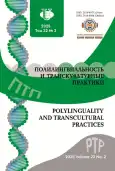Вербализация концепции устойчивого развития в британской и русской лингвокультурах на материале нефинансовых корпоративных отчетов
- Авторы: Лебедева И.Л.1, Макарова К.В.1
-
Учреждения:
- Московский государственный университет имени М.В. Ломоносова
- Выпуск: Том 22, № 2 (2025)
- Страницы: 274-289
- Раздел: ЛИНГВОКУЛЬТУРА. ЯЗЫКОВЫЕ ПРОЦЕССЫ
- URL: https://journal-vniispk.ru/2618-897X/article/view/326847
- DOI: https://doi.org/10.22363/2618-897X-2025-22-2-274-289
- EDN: https://elibrary.ru/PKQWII
- ID: 326847
Цитировать
Полный текст
Аннотация
В исследовании впервые представлен сравнительно-сопоставительный анализ совокупности средств вербализации концепции устойчивого развития на материале нефинансовых отчетов британских компаний на английском языке и аналогичный анализ вербальных и невербальных средств в отчетах российских компаний как на русском, так и на английском языке за 2013-2020 гг. Определена проблематика исследования нефинансовых отчетов как разновидности корпоративного дискурса. Выявлены лингвопрагматические особенности вербализации концепции устойчивого развития в корпоративном дискурсе двух лингвокультур; выделен ряд наднациональных семантических доминант, рекуррентных для нефинансовых отчетов обеих лингвокультур; построены семантические поля, отражающие семантическое ядро и периферию в двух лингвокультурах. Рассмотрен вопрос существования определенных черт русского варианта английского языка в отчетах российских компаний. Намечены перспективы исследования концепции устойчивого развития с позиции когнитивной лингвистики в разных вариантах английского языка.
Об авторах
Ирина Леонидовна Лебедева
Московский государственный университет имени М.В. Ломоносова
Автор, ответственный за переписку.
Email: lebedevamsu@yandex.ru
ORCID iD: 0000-0002-1144-0736
кандидат филологических наук, доцент, доцент кафедры теории преподавания иностранных языков, факультет иностранных языков и регионоведения
Российская Федерация, 119991, Москва, Ленинские горы 1, стр. 13Ксения Владимировна Макарова
Московский государственный университет имени М.В. Ломоносова
Email: kseniya.makarova1997@yandex.ru
магистр лингвистики факультета иностранных языков и регионоведения Российская Федерация, 119991, Москва, Ленинские горы 1, стр. 13
Список литературы
- Dobrosklonskaya, T.G. 2004. “What is Medialinguistics?” Moscow State University Bulletin. Series 19. Linguistics and Intercultural Communication, no. 2, pp. 75-89. Print. (In Russ.)
- Kolobova, A.A. 2008. “Language means as a tool of teambuilding (A case study of American corporate codes).” Transbaikal State University Journal, no. 6 (51), pp. 98-103. Print. (In Russ.) EDN: KTXPTN
- Gershenzon, V.Ye. 2003. Information technologies in environment sustainability management. Moscow: Academia publ. Print. (In Russ.) EDN: QKNNRZ
- Slabinskaya, I.A., and O.B. Benderskaya. 2015. “On the usage of the term sustainability.” Ekonomika i upravlenie: problemy, resheniya. Journal issues, no. 12 (3), pp. 181-186. Print. (In Russ.) EDN: VSQXRJ
- Rozenberg, G.S. 1996. “Dramatic transitional steps towards sustainability.” Bulletin of the Russian Academy of Sciences, no. 66 (5), pp. 436-441. Print. (In Russ.) EDN: ZUCAQL
- Danuyshina, Yu.V. 2011. A multilayered analysis of the Internet business-discourse in English. Institute of Linguistics. Russian Academy of science. Moscow. Print. (In Russ.) EDN: QFKRMT
- Proshina, Z.G. 2016. Russian English: History, Functions, and Features. Edited by Z.G. Proshina and A. Eddy. Cambridge: Cambridge University Press. https://doi.org/10.1017/CBO9781139 683623 EDN: YBXPSH
- Lebedeva, I.L. 2022. “What’s in a Russian English Username? A Case Study of Social Media Accounts Names.” Polylinguality and Transcultural Practices, vol. 20, no. 1, pp. 146-156.
Дополнительные файлы









